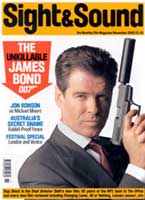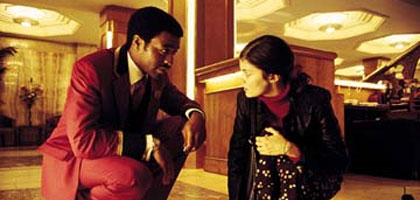
Subterranean Homesick Blues

Nick James on Stephen Frears' London immigrant drama Subterranean homesick blues
Given how smoothly Stephen Frears seems to be able to hop from US-based movies like The Grifters(1990) and High Fidelity (2000) to British-scale features from My Beautiful Laundrette (1985) to Liam (2000), it ought not to be such a surprise to find him portraying the hidden workers of London. Yet Dirty Pretty Things is startling in the current climate because it's so unafraid of qualities which script-formula gurus advise against. It's a seamy urban thriller with no obvious special effects and a weighty political dimension. It stars a little-known male lead in Chiwetel Ejiofor (admittedly playing opposite such European names as Audrey 'Amélie' Tautou and Sergi López) and is set in a downbeat milieu of the dispossessed, filmed with appropriate tension and bleakness by Chris Menges.
Okwe (Ejiofor) is a Nigerian man, once a doctor but now ducking sleep to pull wages on two low-paid posts in London - nightman at the seedy Baltic hotel and daytime minicab driver - with a further sideline in ministering to the STDs of his equally 'stateless' colleagues. He sleeps on a couch belonging to one of the Baltic's cleaners Senay (Tautou), a Turkish immigrant working illegally. When the attentions of the immigration inspectors force her out of her job, she's ripe for victimisation. Okwe feels responsible for her but seems powerless to help. Soon they are caught at the rim of a vicious whirlpool of deprivation.
The sense of a class of workers invisible to the citizens they serve but dependent on each other is deftly achieved. But you shouldn't get the impression this is a worthy film. It's an effective thriller made all the more urgent by the social concerns at its heart, and its horrific elements are as queasy and gripping as anything in The Grifters. Some might find Tautou's inescapable cuteness a touch inappropriate at times, but she remains plausibly brittle and holds her own among this terrific cast. Most of all it seems like a film that could have come from the heyday of 1980s television-financed film-making that we seem to have lost sight of recently - except that the issues it illustrates could not be more vital to the present.
